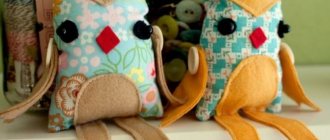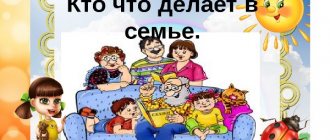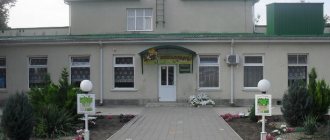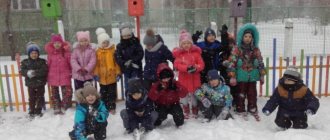FAMILY TRADITIONS: CORRECT DAILY ROUTINE
The well-being of the family and successful upbringing in the family also depend on the formation of the correct (optimal) daily routine, taking into account the life situations of each family and its observance by each family member. The family's daily routine includes the entire daily routine during the day - time for proper sleep, hardening procedures, orderly meals, all types of work and rest. Age and condition are taken into account
children's health. The family's daily routine should have educational significance, which is only possible if children are required to get used to it without being reminded by adults. Seniors must exercise control over the quality implementation of routine tasks and work assignments, evaluate them, and provide assistance in case of difficulties.
Project name: “My Family”
Project type: Creative - research
Children's age: 6-7 years
Project participants: teachers, parents, children
Duration of project activity: September – November
Problem: Kindergarten is the first educational institution with which the family comes into contact. But a kindergarten cannot replace a family - it complements it, performing its own special functions. Effectively organized cooperation between a family and a preschool educational institution can give impetus to building interaction with the family on a qualitatively new basis, which involves not just joint participation in raising a child, but an awareness of the common goals of a trusting relationship and the desire for mutual understanding.
Objective of the project:
- To give parents the opportunity to feel like full participants in the pedagogical process;
- Contribute to strengthening the family;
- Form a positive family image in children.
Project objectives:
- Enrich parents’ knowledge about raising children with publicly available scientific information;
- Enrich parent-child relationships with the experience of joint creative activity;
- To form children’s ideas about family and parents’ professions;
- Foster love and respect for family members;
- Introduce children to the concept of “family tree.”
Estimated results of the project:
- Parents will feel like full participants in the educational process.
- Children will significantly increase the level of formation of a positive family image.
- Children learn better about their roots and what family is.
- In the process of working on the project, teachers and children will become better acquainted with the families of the pupils and their family traditions.
Stage 1 – preparatory (introduction to the topic of the project).
- Search work to select illustrated material on the topic;
- Selection of fiction on the topic;
- Selection of musical repertoire for the final event for Mother's Day
- Development of role-playing games;
Working with parents:
- Conducting a parent meeting;
- A selection of photographs from a family album;
- Creation of a subject-development environment on the topic.
Stage 2 – the main one.
Work with children:
- Conversations of an educational nature on the topic: “My family”, “Our friendly family”, “Dad is my best friend”;
- Reading fiction: Oseeva’s “Sons”, “A Little Boy”;
- Learning poems: E. Blaginina “Let's Sit in Silence”, O. Chusovitina “The Best! ";
- Learning proverbs, sayings about family, friendship;
- Examination of reproductions of paintings by Z. Serebryakova “At Breakfast”, “Daughter Katya with Dolls”;
- Didactic games: “Who needs what for work? ", "How we help our families", exercises "Who are you for...! ", "Will mom be upset if ... ",
- Role-playing games: “Daughters - Mothers”, “Family”, “My Family’s Favorite Holiday”;
- Productive activity: “My family”;
- Making a gift for mom.
Working with parents:
- Consulting parents on the topic “Recommendations for caring parents”;
- Recommendations for parents:
Talk with children (relatives, names, professions, favorite activities);
Talk with children about the content of works of fiction read in preschool educational institutions;
Tell children about your childhood and family traditions.
- Drawing a “Family Family Tree”;
- Album design "My Family".
Stage 3 – final.
- Musical and recreational leisure “Come on, moms! » for Mother's Day.
Report on project activities
Family and kindergarten are two social institutions that stand at the origins of our future, but often they do not always have enough mutual understanding, tact, and patience to hear and understand each other. Misunderstanding between family and kindergarten falls heavily on the child.
Conducting conversations with children, I noticed that not all children know about their family, what their parents and grandparents do, few children know their ancestry, and family holidays and traditions are becoming a thing of the past. Therefore, we, adults, must help children understand the importance of family, cultivate in children love and respect for family members, and instill a sense of attachment to family and home. In order to study the family, clarify the educational needs of parents, establish contact with its members, and coordinate educational influences on the child, the idea arose to create the “My Family” project.
Our project was creative and research in nature.
We set the following tasks:
- Introduce children to the concept of “Genealogical family tree”;
- Enrich parent-child relationships with the experience of joint creative activity;
- To form children’s ideas about family and parents’ professions;
- Foster love and respect for family members.
During the implementation of the project, we discussed issues related to project activities with parents at a meeting; they were offered the following tasks to choose from:
- Album “My Family Album”
- Creation of a family coat of arms
- Design of the photo newspaper “My Friendly Family”.
Parents responded to the proposed tasks, took up the work with interest, and almost no family was left behind.
Classes were held with the children on the formation of a holistic picture of the world “The Flower of Family Happiness”, “Me and My Family”, conversations were held “My Family”, “My Home, My Family”, where children’s ideas about the family as a friendly, loving, caring team, as well as conversations about family hobbies and games.
During art classes, children drew their families, portraits of their mothers,
dads, grandparents, family bouquet, gifts for moms.
Gifts for mothers were made for the appliqué lesson
During classes on speech development, children learned poems about family members, proverbs and sayings about family and friendship. A survey “Family Traditions” was conducted with parents and a consultation was held on the topic “Recommendations for caring parents.” The group created a photo newspaper “My Friendly Family” together with parents and children.
It was decided to sum up the results of the project at a family holiday dedicated to Mother’s Day “Come on, moms!” "with the invitation of family members and the older generation. At the festival, family trees, albums, fun games with the participation of mothers, songs, and dance compositions were presented.
The most active families were awarded letters of gratitude, certificates and gifts.
The goals of the project were achieved, the tasks were solved, the expected results of the project were confirmed.
Presentation on the topic: “My Family” project, group 2
Project “Family Traditions” in the preparatory group of kindergarten
Project “Family Traditions” in the preparatory group of a preschool educational institution
Author: Leontyeva Anna Vladimirovna, teacher of the preschool educational institution “Kindergarten 233”, Yaroslavl. Description of material: this project was developed for preschoolers in the preparatory group. The material will be of interest to teachers, educators and parents. The project is designed for 2 weeks. Can be used in preparation for the lexical topics “Traditions” and “Family”. “Family traditions... They contain the wisdom of our ancestors. Family traditions... They have the stamp of time. Family Traditions – A Wonderful Heritage. We will bequeath it to our children” I. Nekrasova Abstract: Family is the closest and dearest people who surround us. They give us their warmth and care. A family is like a small state that has its own laws and traditions. It is family traditions that make it stronger and more friendly, and unite its members among themselves. The integrity of the family and its spirituality are based on traditions. Thanks to family traditions, our home becomes cozy and hospitable. The “Family Traditions” project is aimed at solving the problem of children’s insufficient knowledge of family values. The relevance of the topic is that raising a child begins with the family. Children should know family traditions, adopt them and pass them on from generation to generation. Traditions can be very different:
joint events, memorable surprises and gifts, family recipes, a bedtime story told by mom, and many other little things. Although, in fact, these are not trifles at all. Thanks to knowledge about family values and customs, warm relations between different generations are maintained. The family maintains a sense of stability and peace. Acquaintance with family traditions should begin with a generalization of children's knowledge about the traditions of their people (folk holidays, folk toys, folk songs) and knowledge about their family.
The goal of the project: to develop interest in one’s family, the history of one’s family, and preserve family traditions. Project objectives: to form ideas about family and family relationships; Develop an interest in your family, the history of your family, and the preservation of family traditions; Create conditions for teamwork between group teachers, students and parents on issues of family values, using traditional family dishes as an example. Project type: informational, practice-oriented. Project duration: 2 weeks. Expected results: all project participants will acquire knowledge about the traditions and customs of their family. Children will expand their knowledge of the traditions of the Russian people, traditional toys, folk dances, and holidays. Get an idea of the family tree. Parents and children will take part in compiling the “Traditional Family Dishes” album. They will acquire knowledge about the importance and need to honor what is passed down to us from generation to generation. Teachers will be able to expand their knowledge and understanding of the history of their people, and will receive information about the families of their students, their traditions and customs. Products of the project: 1. Compilation of a card index: “Russian folk games for children”; 2. Compiling a card index “My Family” - eye gymnastics, breathing exercises, psycho-gymnastics, physical education, finger gymnastics, riddles, poems about family; 3. Selection of tales about family; 4. Drawing “My Family”; 5. Application using the cutting technique “My Family’s House”; 6. Modeling “My family’s birthday”; 7. Album “Traditional family dishes”. Project implementation stages: Stage 1. Preparatory: study of scientific and methodological literature on the topic “Family”, “Traditions of the Russian people”, organization of work with parents in preschool settings. Studying Internet resources on the topic of the project. Selection of fiction for use in working with children as part of the project: fairy tales, poems about family, proverbs. Stage 2. Project implementation: conversations with children on the topics of the week: “Folk holidays and traditions”, “My home. My family", "Pedigree of my family". Stage 3. Final: obtaining the products of the project implementation. Plan of activities: Cognitive development:
conversations with children about Russian traditions, folk holidays and festivities, Russian folk toys;
Conversations about family, family tree. Speech development:
compiling a story about your family according to the “Genealogical Tree of My Family” scheme;
Social and communicative development:
Didactic games “Name it kindly”, “Complete the sentence”;
“A Ball of Magic Words”; "A piggy bank of good deeds." Artistic and aesthetic development
• Drawing “My Family”;
• Application using the cutting technique “Home for my family”; • Modeling “My Family’s Birthday” Reading fiction: • Fairy tale “Stupid gentleman”; • Fairy tale “The Magic Family” by I.L. Gamazkova; • Fairy tale “Nestling” (From the book “Methodology of Fairytale Therapy”, author V.M. Sertakova) Conclusions: During the project activities, teachers, together with children and parents, came to a consensus: traditions strengthen the family, make it cohesive and united.
Promote interaction and strengthen family ties. Download the Card Index on the topic “My Family”
Presentation on the topic: Family traditions
We recommend watching:
Project in the senior group of a kindergarten Project in the senior group on the topic “Trees and shrubs in spring” Practice-oriented project for landscaping the territory of a kindergarten Educational project. Second junior group
Similar articles:
Educational and creative project on the theme “Golden Autumn”. Junior group
Project for children of the senior group “Our cheerful garden”
"FAMILY TRADITIONS: CULTURE OF COMMUNICATION"
The only real luxury is the luxury of human communication. Do we know how to use this luxury in our families, do we teach this to our children?
The family is the child’s first school of communication. In a family, a child learns to respect elders, take care of the elderly and sick, and provide all possible assistance to each other. In communicating with people close to the child, in joint household work, he develops a sense of duty and mutual assistance. The best means of cultivating correct relationships is the personal example of father and mother, their mutual respect, help and care, manifestations of tenderness and affection. If children see good relationships in the family, then, as adults, they themselves will strive for the same beautiful relationships. In childhood, it is important to cultivate a feeling of love for your loved ones - for parents, for brothers and sisters, so that children feel affection for one of their peers, affection and tenderness for their younger ones.
Preschoolers receive their first moral experience in the family, learn to respect their elders, take them into account, learn to do something pleasant, joyful, and kind to people. The moral principles of a child are formed on the basis of and in connection with the intensive mental development of the child, the indicator of which is his actions and speech. Therefore, it is important to enrich children’s vocabulary and, when talking with them, to provide an example of good pronunciation of sounds and words and sentences in general. In order to develop speech, parents should teach children to observe natural phenomena, identify similar and different things in them, listen to fairy tales and stories and convey their content, answer questions and ask their own. Speech development is an indicator of an increase in the child’s general culture, a condition for his mental, moral and aesthetic development.
FAMILY TRADITIONS: JOINT HIKES
Excursions and trips with the whole family to the forest, to the river, to pick mushrooms and berries, to
Fishing leaves an indelible impression that a child will carry throughout his life. When communicating with nature, a child is surprised, happy, proud of what he saw, heard the singing of birds - at this time the education of feelings occurs. The feeling of “beautiful” helps to cultivate the need to protect the environment. Excursions and hikes with the whole family are also a good way to educate children patriotically. Introduction to the history of the native land, including the history of the clan and family as its integral part, contributes to the formation of a citizen, teaches children to be responsible before the past and future.
FAMILY TRADITIONS: HOLIDAYS
Family holidays on the occasion of the birthday of adults and children, as well as other significant dates, such as parents’ wedding day, the day of a memorable event in the life of family members (entry to school, victory in a competition, etc.) have significant educational potential. Family holidays also include holding public holidays in the house such as Mother's Day, Father's Day, Family Day, and professional holidays for adults. Preparing children and adults for the upcoming holiday (coming up with a script, wall newspapers, preparing holiday treats), giving gifts with a special emotional upsurge creates that atmosphere of solemnity, joy and happiness that forms spiritual culture and unites the family as a team.
FAMILY TRADITIONS: JOINT WORK
Joint work is the basis for organizing the life and everyday life of a family, which is based on the equality of all members, involving children in solving economic issues of family life, running the household, and doing feasible work. Children are directly involved in household work, learn to serve themselves, and perform feasible labor duties to help their father and mother. Their success in learning, as well as in general labor education, depends on how the labor education of children before school is delivered. In preschool age, children are very mobile, they cannot concentrate on one thing for a long time, or quickly switch from one type of activity to another. Schooling will require concentration, perseverance, and diligence from the child. Therefore, it is important, even in preschool age, to accustom the child to the thoroughness of the tasks he carries out, to teach him to complete the work he has begun,
show persistence and perseverance. It is necessary to develop these qualities (except for play) in the process of everyday work, including the child in the collective work of cleaning the room, in the garden.
The presence in children of such an important personality quality as hard work is a good indicator of their moral education. By how a child relates to work, what work skills he has, others will judge his value in society. Love of work and the ability to work in a team are the keys to the success of our children in their future lives.
In addition, it is difficult to overestimate the importance of labor in human life. Physical labor ensures high vitality of muscles and all human organs: it improves all physiological processes in the body - proper breathing, blood circulation, metabolism, growth of the whole body and individual organs. Physical labor is a means of combating fatigue, especially for people engaged in mental work. Forming a work culture, changing types of work, and a reasonable combination of them in a child’s daily routine ensures his successful mental activity and maintains working capacity.
FAMILY TRADITIONS: READING
Reading occupies a special place in raising a child in the family. In preschool age, a child especially loves to listen to fairy tales that adults read to him, stories from the lives of people and animals. From books he learns about good people, about their deeds, about animals, plants. In the fairy tale, the strong, dexterous, fair, honest and hardworking person always wins, while the evil, unkind person is punished by people and society. Listening to a fairy tale, a child does not remain indifferent to the fate of the hero: he worries, worries, rejoices and is upset, that is, he develops feelings and gradually develops an interest in the book. In the future, when the child learns to read on his own, it is important
consolidate interest and develop the skill of independent and systematic reading. This skill does not appear on its own; it requires coordinated and skillful work of the family. Only this will introduce the child to reading, and he will begin to consider books as his companions in acquiring new knowledge. The emerging interest in reading will lead the child to the library or bookstore. He will have his own heroes whom he will imitate.





